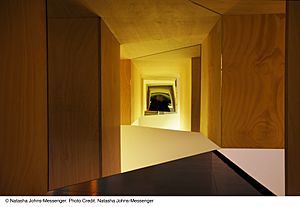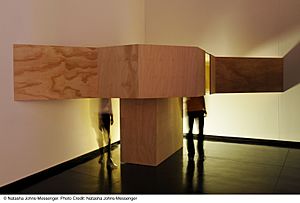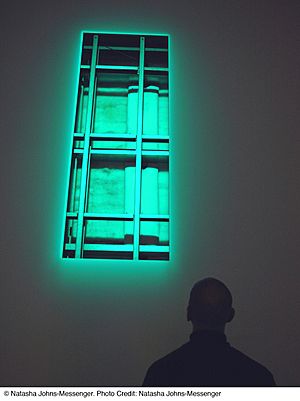Natasha Johns-Messenger facts for kids
Natasha Johns-Messenger (born 1970) is an Australian artist and filmmaker. She has lived and worked in New York and Melbourne. Natasha is well-known for her large art pieces that play with how we see space and light. Her art often uses tricks, illusions, and ideas from buildings and light science. She also creates photography, digital paintings, and sculptures.
Contents
About Natasha Johns-Messenger
Natasha Johns-Messenger comes from a family of talented people. Her great-grandfather was Dally Messenger, a famous Australian rugby player. Her sister, Julia Messenger, is a singer. Natasha's mother, Catherine Marie Johns, is a poet and writer. Her father, Dally Messenger III, is an author known for his work with the Australian civil celebrant movement.
Natasha's Art Career
Natasha Johns-Messenger mixes ideas from architecture, film, and visual arts to create new kinds of sculptures. She makes art that changes how you experience a space. She uses things like special mirrors, live video projections, and copies of building styles. Her art often includes ideas from science, math, and shapes.
Natasha is very interested in how our bodies fit into a space. She started thinking about changing "how we see" things when she was a child. She spent many days drawing and photographing shapes from everyday objects.
Her Education and Early Art
Natasha started her art journey as a painter. She earned her first art degree in 1994. In 2000, she completed her Masters of Fine Arts (MFA) at the Royal Melbourne Institute of Technology (RMIT). She has shown her art in big galleries. These include the Museum of Contemporary Art Australia in Sydney and the Australian Centre for Contemporary Art in Melbourne.
Moving into Filmmaking
In 2012, Natasha earned another MFA, this time in Film, from Columbia University in New York. This marked a new step into making movies. She combines her love for abstract art with moving images.
Her final film at Columbia, Blackwood, won many awards at the 2012 Columbia University Film Festival. These awards included Best Film and Best Director. Blackwood was shown at the Warsaw Film Festival and in 40 other film festivals, winning many more awards. Her next film, Off-Ramp, also won awards for Best Student Film and Best Actress.
Major Art Shows and Awards
Natasha Johns-Messenger's art has been shown in international group exhibitions. Her work has been alongside famous artists like Dan Graham, James Turrell, and Lawrence Weiner.
In 2009 and 2010, she was asked by the New York Public Art Fund to create her work ThisSideIn. In 2010, she made Recollection for No Longer Empty in New York.
Awards and Recognition
Natasha has won several important awards:
- In 2007, she won the Den Haag Sculptuur Rabo Bank Prize in the Netherlands. Queen Beatrix of the Netherlands presented this award to her.
- In 2005, Natasha won the Melbourne Prize for Urban Sculpture. She won this with her group OSW (Open Spatial Workshop) for their sculpture groundings.
Other Notable Exhibitions
Some of her other exhibitions include:
- Yellow, 2011, at the Australian Centre for Contemporary Art (ACCA) in Melbourne.
- Through to You, part of "Freedom-American Sculpture" in The Hague, Netherlands.
- Of Water, 2008, at the Gallery of Modern Art (GOMA) in Brisbane.
- ISCP Open Studio Exhibition in New York.
- Trappenhuis (Stairwell) Installation at the Escher Museum in the Netherlands.
In 2020, the Adelaide//International exhibition at the Samstag Museum in Adelaide featured an installation called Somewhere Other. This was a collaboration between John Wardle Architects and Natasha Johns-Messenger. This artwork was also Australia's entry in the 2018 Venice Architecture Biennale. The exhibition was supposed to run from February 28 to June 12, 2020. However, it closed early in March 2020 because of the COVID-19 pandemic in Australia.
 | Janet Taylor Pickett |
 | Synthia Saint James |
 | Howardena Pindell |
 | Faith Ringgold |




